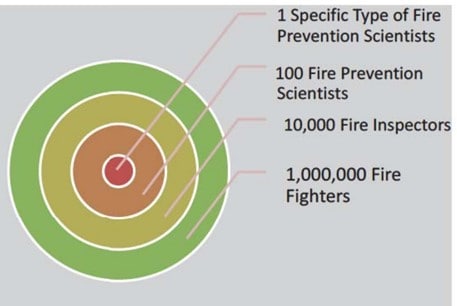I just completed a video interview for a news organization. While I am always enthusiastic about the subject, I was very boring and not newsworthy. I kept talking about the monotonous routines of ‘plan-do-check-act’ that keep adapting to reduce the ever-changing food fraud opportunities.
I used the example that our food fraud prevention research was more like a fire inspector checking that the emergency exit and sprinkler systems worked. If we are doing our jobs, we are NOT the newsworthy, exciting firefighters saving a baby from a burning building.
There are no evening news clips that follow a fire inspector checking fire extinguishers –nor should there be!
We do need firefighters and super-technical fire engines, but there is a critical role for fire inspectors, fire prevention engineers, and fire prevention scientists. For food fraud prevention, those positions are auditors and inspectors, technology providers, laboratory scientists, and food fraud prevention scholars who focus on the root cause and vulnerability reduction.
Excerpt from Food Fraud Prevention (Spink, 2019, pages 74-75):
Sidebar: Fire Prevention and Ben Franklin
Food fraud prevention is not exciting, and if done right, it is intentionally routine, monotonous, and boring. It is exciting and newsworthy when a firefighter runs out of a burning building to rescue a baby. On the other end of the spectrum, watching a fire inspector make sure that the smoke detectors are working and the fire exits are well marked is about as exciting as “watching paint dry” (which is not very exciting). Listening to a building code review of fire resistance structural features is literally reading an engineering textbook (also even less exciting than watching paint dry). BUT the most efficient and effective way to reduce the “fraud opportunity” is the prevention details. It may be exciting to purchase new and faster fire engines to put out fires faster, but it’s much more efficient to try to prevent the fires from starting in the first place (Figure 2 9).
- For every 1,000 firefighters who are trained in fire intervention, there might need to be 1 fire inspector.
- For every 1,000 fire inspectors who are trained in the detection of vulnerabilities of fires, there might need to be 1 fire prevention engineer.
- For every 1,000 fire prevention engineers who are trained in prevention science, there may need to be 1 research scientist studying fire incidents for new root causes.
- AND each person and job are critical to protecting society from injury from fires. Some of the actors are focused and trained on a different topic.
- A complex and complicated follow-up assessment is how much is invested in each type of job.
Questions to start addressing fire prevention could include: Are the firefighters equipped or trained to conduct fire inspections? Maybe. Are the first responders educated and trained on civil engineering theories about how to reduce the spread of chemical fires? No. Should they be? No. BUT, the people “accountable” for protecting public safety ARE “accountable” for addressing this root cause or vulnerability.
The famous Ben Franklin quote of, “an ounce of prevention is worth a pound of cure,” was reportedly based on his work during the creation of the first Philadelphia Fire Department (Franklin 1735). When addressing fire prevention, he is reported to actually have said: “an ounce of prevention is worth TEN pounds of cure.”
The application to food fraud prevention is that the same fire prevention theory holds true for food fraud prevention. There is a need to step back and consider the root cause as well as the most efficient and effective ways to address the prevention actions… regardless of your current experience or education. This is consistent with many other concepts that will be covered later, including ISO 31000 Risk Management, which begins with “Establishing the context.” For every 1,000,000 food investigators, there only needs to be a handful of food fraud prevention scientists.

Takeaway Points:
- Fire prevention is a practical example that applies to food fraud prevention – also, this is a more everyday example that can help explain the complex ideas.
- We all need food fraud prevention to be boring because that means the monitoring, managing, countermeasures, and control systems are working.
- As with fire prevention, it is critical to have a public-private partnership that not only finds ways to respond more quickly but also spends time developing and implementing the new ideas.

